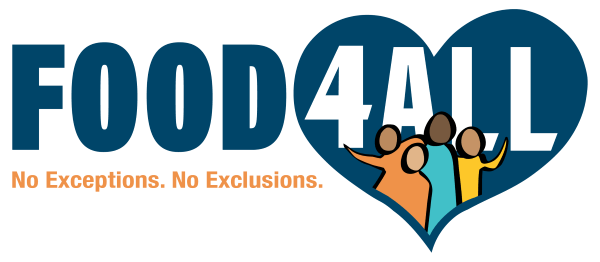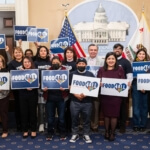Struggling to make ends meet:
Food Insecurity In California
Published on Jun 15, 2021 in CalFresh, Immigrants, State Legislation
Maribel’s story repeated below in English
Mi nombre es Maribel y soy originaria de Sinaloa, México. He vivido en City Heights, San Diego, California, durante 21 años con mis dos hijas, Leslie y Gisel, y mi esposo. Siempre me he dedicado a mis niñas y no trabajo fuera de casa, excepto como voluntaria en varios grupos de la comunidad, incluido un comité organizador latino [1] que lleva a cabo talleres sobre salud y educación para la comunidad.
En los 21 años que llevamos en Estados Unidos, nada nos ha impactado como el último año [de la pandemia]. Mi esposo dio positivo en la prueba de COVID en diciembre, y no pudo conseguir trabajo por dos semanas. Porque es un subcontratista – no trabajas no ganas. Somos una familia indocumentada, por lo que no recibimos ningún apoyo del gobierno. Doy gracias a Dios por ser parte de grupos comunitarios que pudieron brindarnos ayuda y recursos.


Una vez solicité y recibí los beneficios de CalFresh cuando mi esposo no podía conseguir trabajo debido a su estado. Tenía dos niñas pequeñas que cuidar y aunque solo recibimos $350 para toda nuestra familia y tuvimos que estirarlo todo lo que pudimos, teníamos algo para comer. Cuando nos vimos afectados por la pandemia, quise presentar una solicitud nuevamente, pero tenía miedo porque escuchamos del expresidente Trump que si una familia pide ayuda, se le considera una carga pública, lo que podría llevar a que se le niegue una tarjeta verde, o la residencia debido a nuestro estado migratorio [indocumentado], aunque necesitábamos la ayuda y no teníamos suficiente dinero para comprar comida, nuestro miedo se volvió más grande que nuestra necesidad.
Desde que llegué a este país supe que no sería fácil conseguir un estado migratorio. Asistí a numerosos talleres con abogados, pero nos dijeron que, a menos que recibiéramos una amnistía, sería una posibilidad remota. Mis dos hijas nacieron aquí y espero que mi hija mayor pueda pedir la residencia por nosotros o que las reglas de inmigración cambien en el futuro. La verdad es que no tengo mucho miedo. Cuando escuchamos que están haciendo redadas, le pido a Dios que nos proteja. No vinimos a este país para hacer nada malo. Vinimos aquí para progresar y contribuir a este país. Eso es lo que siempre hemos hecho mi esposo, mis dos hijas y yo.
Nuestra comunidad es diversa y, aunque todos venimos de una variedad de culturas, estamos unidos y trabajamos juntos. La mayoría de nosotros somos pobres y necesitamos más acceso a una mejor educación, beneficios para la salud, alimentos saludables, pero somos ricos en cultura. Hay muchas similitudes entre nuestras culturas y familias, y la necesidad de acceso a alimentos saludables y asequibles para nosotros y nuestros hijos es una de ellas. Tenemos algunos huertos comunitarios pequeños por aquí y tiendas con alimentos orgánicos, pero no es suficiente. He estado en bancos de alimentos que brindan alimentos de calidad (frutas, verduras, comida enlatada, pollo), así que comencé a correr la voz y también a llevar vecinos que tienen necesidad, pero carecen de transportación para recoger comida.
Conozco familias que están pasando por situaciones difíciles: su [principal asalariado] ha sido deportado y están solos y asustados. Debido a esto, tienen miedo de solicitar CalFresh, a pesar de que tienen hijos que son ciudadanos. Si se aprueba la SB464, las personas de nuestra comunidad y todos los miembros de mi familia podrían acceder a los alimentos sin repercusiones. Si solicito CalFresh ahora mismo, la única persona que calificaría es mi hija menor. Aunque mi hija mayor depende de nosotros, no califica.
Mi esperanza es que mi esposo y yo tengamos residencia y, en última instancia, nos convirtamos en ciudadanos. Veo mi futuro aquí, no en México. Mi sueño es ver a mis dos hijas como profesionales. Como les digo, “estamos aquí, haciendo un sacrificio por ustedes para que tengan un buen futuro y obtengan mejores oportunidades laborales”. No es una situación justa que nosotros, junto con otros inmigrantes indocumentados, no podamos acceder a los alimentos que necesitamos. Pagamos impuestos y contribuimos a este país, pero como no tenemos un número de seguro social, nos tratan como si no existiéramos. Necesitamos aprobar el proyecto de ley Food4All porque la alimentación es fundamental y, en definitiva, los que más sufren son los niños. Vivimos en el país más poderoso, pero los niños carecen de los alimentos que necesitan.
Lo mínimo que puede hacer nuestro gobierno es brindar acceso a los alimentos a todos, independientemente de su estado migratorio.
Maribel Arias: Access to food should not depend on immigration status
My name is Maribel, and I am originally from Sinaloa, Mexico. I have lived in City Heights, San Diego for 21 years with my two daughters, Leslie and Gisel, and my husband. I have always dedicated myself to my girls, and do not work outside the home except for volunteering in various groups in the community, including a Latino organizing committee that conducts workshops on health and education for the community.
In the 21 years that we have been in the United States, nothing has impacted us like the last year [of the pandemic]. My husband tested positive for COVID in December, and could not work for 2 weeks. Because he is a subcontractor – no work means no income. In April 2021, we had another 3 weeks without income. We are an undocumented family, so we did not get any support from the government. I thank God that I am a part of community groups who were able to provide us with some assistance and resources.
I once applied and received CalFresh benefits when my husband couldn’t get work because of his status. I had two little girls to take care of and even though we only received $350 for our entire family and had to stretch it as far as we could, we had something to eat. When we were impacted by the pandemic, I wanted to apply again but was afraid because we heard from former President Trump that if you are asking for help, you are considered a public charge, [which could lead to being denied a green card, visa, or admission back into the country.] Because of our [undocumented] status, even though we needed the assistance and did not have enough money to purchase food, our fear became greater than our need.
Since I arrived in this country, I knew that it would not be easy to get status. I attended numerous workshops with lawyers, but we were told that unless we receive amnesty, it would be a long shot. My daughters were both born here, and my hope is that my oldest daughter could petition for residency on our behalf, or that the immigration rules will change in the future. The truth is, I am not very scared. When we hear that they are doing raids, I ask God to protect us. We did not come to this country to do anything wrong. We came here for progress and to contribute to this country. That is what my husband and I and my two daughters have always done.
Our community is diverse, and, while we all come from a variety of cultures, we are united and work together. Most of us are poor and need more access — to better education, health benefits, healthy food — but we are rich in culture. There are so many similarities across our cultures and families, and needing access to healthy and affordable food for us and our children is one of them. We have a few small community gardens around here and stores with organic food, but it’s not enough. I have been to food banks that provide quality food — fruits, vegetables, canned food, chicken — so I have started spreading the word and also giving people rides to pick up food because they do not have a way to get there.
I know families who are going through difficult situations — their [primary wage earner] has been deported, and they are alone and afraid. Because of this, they are afraid to go and apply for CalFresh, even though they have children who are citizens. If SB 464 passed, people in our community and everyone in my family could access food without repercussions. If I apply for CalFresh right now, the only person that would qualify is my youngest daughter. Even though my oldest is dependent on us, she does not qualify.
My hope is for my husband and I to have residency, and to ultimately become citizens. I see my future here, not in Mexico. My dream is to see both of my daughters as professionals. As I say to them, “we are here, making a sacrifice for you so that you have a good future and get better job opportunities.” It’s not a fair situation that we, along with other undocumented immigrants, can’t access the food we need. We pay taxes and contribute to this country, but because we don’t have a social security number, we are treated like we don’t exist. We need to pass the Food4All bill because food is essential and, ultimately, the ones that suffer the most are the children. We live in the most powerful country, yet children lack the food they need.
The least our government can do is provide food access to everyone, regardless of status.



